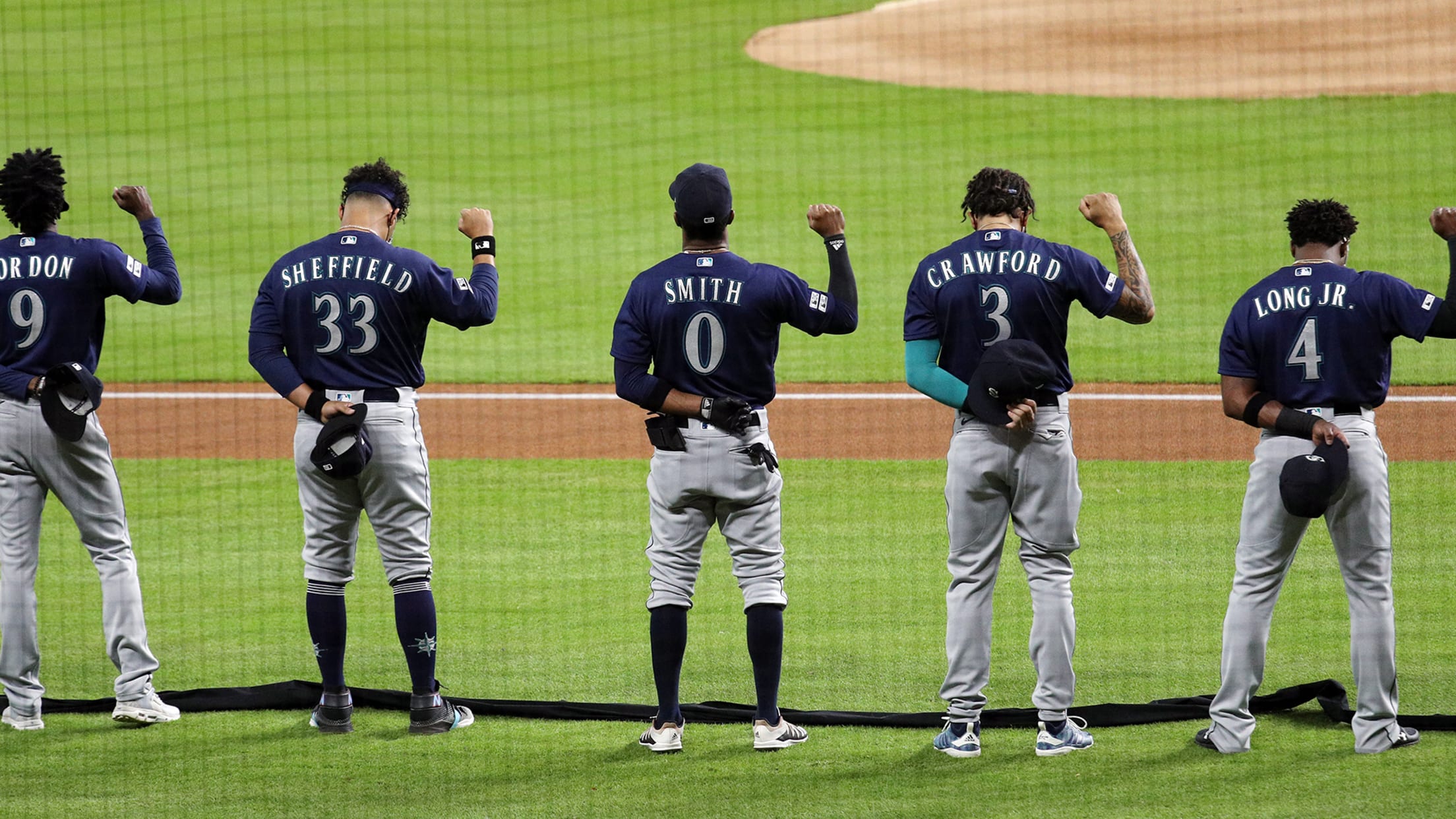
A generation of Black players finds its voice
The inspiration for a movement came while Tigers outfielder Cameron Maybin was at home watching NFL Network.
Ten days after the death of George Floyd in Minneapolis on May 25, more than a dozen Black football stars collaborated on a video asking the NFL to address its systemic racism and make amends for not supporting players’ rights to peacefully protest in the past. Their message resonated deeply with Maybin, who felt similarly compelled to use his platform to demand change and justice for his community.
Maybin immediately texted his best friend, Mariners second baseman Dee Gordon.
“Did you see that video?” he wrote.
“Cam, we just shared a brainwave,” Gordon wrote back. “We gotta do something like this.”
Black players -- who represented just 7.8 percent of MLB’s player pool on Opening Day 2019 according to USA Today -- often felt reluctant to speak out on sensitive issues, fearing the type of backlash and repercussions former NFL quarterback Colin Kaepernick faced when he began kneeling during the national anthem in 2016 to protest police brutality and the oppression of people of color. But as they watched protestors march in cities across the country in response to the killings of Floyd, Breonna Taylor, Ahmaud Arbery and countless others, they felt an irrepressible call to action.
“It was long overdue for us to just not be afraid to use our voices and come together as a whole,” Maybin said.
It was long overdue for us to just not be afraid to use our voices and come together as a whole.
Cameron Maybin
Maybin reached out to peers across the league via a group chat that includes roughly 130 Black players, including Minor Leaguers. Initially formed to provide updates on the COVID-19 situation and create a forum to discuss issues within their community, the text chain suddenly became an effective recruiting tool. At Maybin’s direction, 61 players past and present -- including Aaron Judge, Andrew McCutchen and CC Sabathia -- came together to amplify their voices in another montage video, resulting in a powerful show of support for the Black Lives Matter movement.
In a way, the video served as a trailer for what Maybin hopes will be an enduring state of mobilization for Major League Baseball’s Black players. Last month, he helped spearhead the formation of The Players Alliance, which now includes more than 100 active and retired professional baseball players. Their mission is to “create an inclusive culture within baseball and the community, where differences are leveraged to elevate racial equality and provide greater opportunities for the Black community, both in our game and the places we live in, play in, and care about most.”
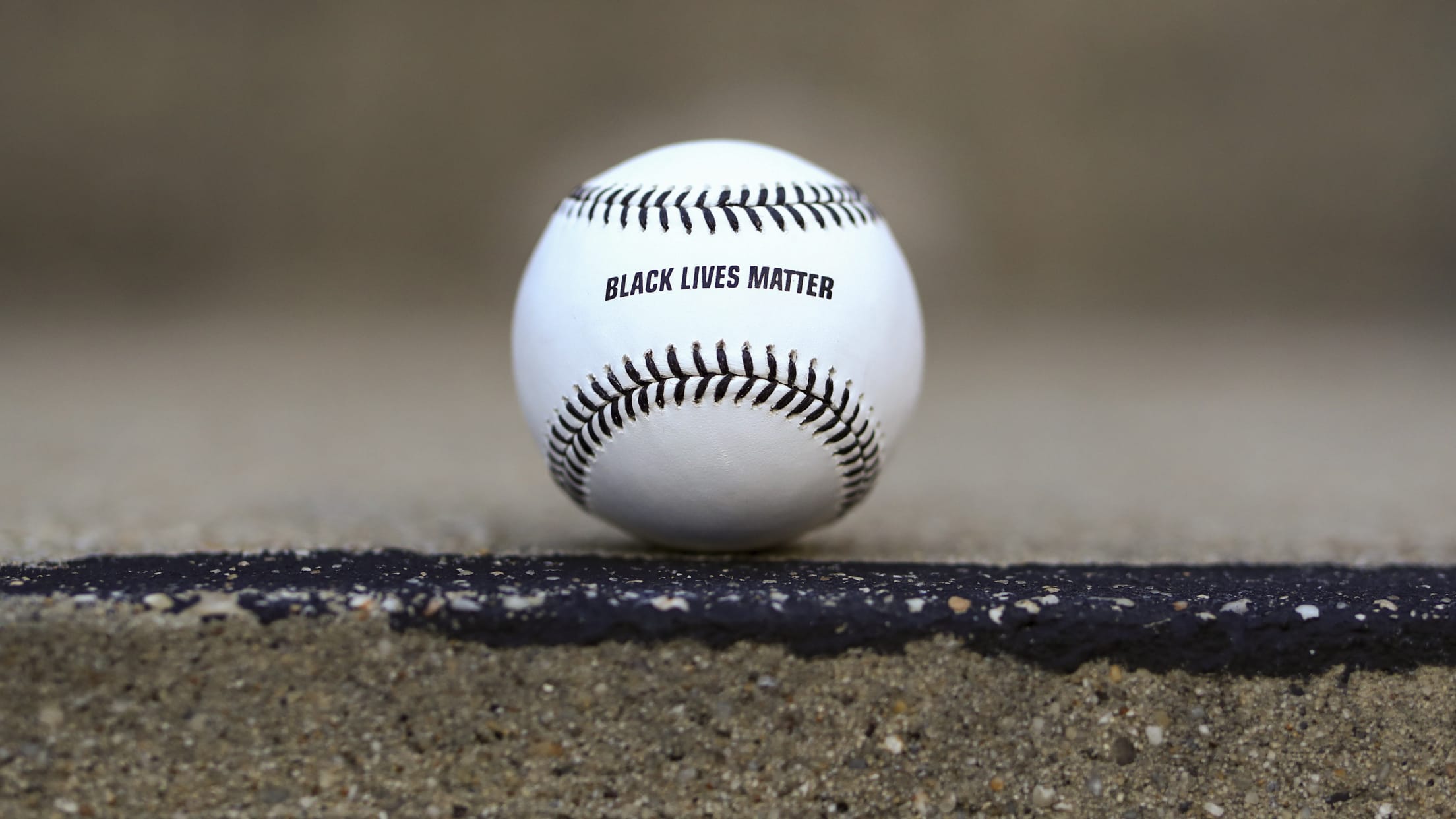
The Giants have been playing The Players Alliance’s video on the Oracle Park scoreboard at each of their home games this year, but on Wednesday night, the ballpark was silent as part of a louder statement initiated by athletes across the sports landscape. Following the lead of the Milwaukee Bucks of the NBA and the Milwaukee Brewers, the Giants and Dodgers decided not to play to protest the shooting of Jacob Blake, an unarmed Black man who was shot seven times in the back by a police officer in Kenosha, Wis., on Sunday.
After the Bucks refused to take the court for Game 5 of their playoff series against the Orlando Magic, the NBA postponed its slate of games on Wednesday, setting off a wave of action across other leagues. Inspired by their Milwaukee brethren, the Brewers voted unanimously to sit out their scheduled game against the Reds. Gordon and the Mariners also decided not to play against the Padres. All WNBA games and five of six MLS games were postponed as well.
“There are serious issues in this country,” Gordon tweeted Wednesday. “For me, and for many of my teammates, the injustices, violence, death and systemic racism is deeply personal. This is impacting not only my community, but very directly my family and friends. Our team voted unanimously not to play tonight. Instead of watching us, we hope people will focus on the things more important than sports that are happening.”
Dodgers star Mookie Betts, who is listed as a member of The Players Alliance, said he wasn’t going to play regardless of what happened on Wednesday. Dave Roberts said he wasn’t going to manage. When their feelings became clear, the rest of the Dodgers rallied around them.
“For me, I think no matter what, I wasn’t going to play, just because I have to stand by my heart here, my thoughts that changes need to be made,” Betts said. “I need my platform to at least get the ball rolling. I talked to my teammates and told them how I felt, and they were all by my side. And I can’t ask for better teammates than I have here. I appreciate everything that was said and done so far.”
On Thursday, the eve of Jackie Robinson Day, seven more MLB games were postponed after teams opted not to take the field, with the Mets and Marlins coming together for a particularly poignant moment at Citi Field. The Mets, led by Dominic Smith and Billy Hamilton, took the field before holding a 42-second moment of silence in honor of Robinson, who broke the color barrier with the Brooklyn Dodgers 73 years ago.
All players subsequently walked off the field in a unified show of protest. The Marlins’ Lewis Brinson punctuated the moment by draping a Black Lives Matter T-shirt on home plate.
"We showed tonight we're not just going to shut up and dribble, shut up and play ball,” Smith said. “We stand up for what we believe in."
Earlier in the day, members of The Players Alliance announced that they would donate their salaries on Thursday and Friday to support efforts to combat racial inequality.
“The color of our skin is the uniform we wear every day,” the group said in a statement. “We cannot change that. What we can change is the pain and the injustice the Black community has suffered for far too long. We are determined to use our platform to speak out and encourage our teammates and fans to help make our voices even louder.
“We cannot stand idly by and wait for change -- in our game or in our country.”
This rise in player activism comes at a time when industries across America have been forced to confront uncomfortable truths about their own blind spots and racial inequities. Despite the development of programs aimed at promoting inclusive hiring practices, people of color remain underrepresented within MLB’s power structure. The league has just two Black managers -- the Astros’ Dusty Baker and Roberts -- and two Black heads of baseball operations -- the White Sox’s Ken Williams and the Marlins’ Michael Hill.
No majority team owner is Black, though Hall of Famer Derek Jeter -- the first Black CEO in baseball history -- and Los Angeles Lakers icon Magic Johnson hold minority stakes with the Marlins and Dodgers, respectively. Kansas City Chiefs quarterback Patrick Mahomes, the son of former Major League pitcher Pat Mahomes, also joined the Royals’ ownership group this season.
“I believe that Major League Baseball has tried to position itself better, but it's just not been able to accomplish the mission,” said Dave Stewart, a three-time World Series champion as a player who has served as an agent and as the D-backs’ general manager. “And so these players, standing up, having a voice, letting their opinions and their feelings be known, I think it’s great for the game of baseball.”
The relative lack of Black executives and managers has contributed to feelings of marginalization for Black players, who have faced racial abuse from fans on the field, microaggressions in the clubhouse and coded language in scouting reports that perpetuates notions that they are valued more for their athleticism than their intelligence. That culture led many players to internalize their experiences for a long time, but the national reckoning spurred by Floyd’s death brought these issues to the fore.
Across MLB, clubs hosted conversations and roundtables with Black players to give them a space to speak openly about their encounters with systemic racism and social injustice. Indians outfielder Delino DeShields tweeted about instances of racial profiling he faced in Atlanta and Kissimmee, Fla., in 2012. Torii Hunter, a nine-time Gold Glove Award winner, revealed that he asked for a no-trade clause to prevent him from being dealt to the Red Sox because of the racial slurs he regularly heard while playing in Boston. (The Red Sox later confirmed Hunter’s account, tweeting “This is real.”)
“I think that the mentality of a lot of Black players coming through was, ‘If I speak up, I'm going to be put on the sidelines as a troublemaker and be judged in that way,’” said two-time All-Star and MLB Network analyst Harold Reynolds, who moderated panels with Black players and executives around the game. “We've seen more guys speak up, and I think you're seeing a flood of things that have been held in for a number of years. It's refreshing. I believe it's taken everybody aback so much because I don't think people really realize a lot of stuff is still going on. Because as the years have gone by, you learn how to just move on, just keep moving.”
The conversations have helped awaken people of all colors, backgrounds and positions in baseball to the realities that minorities within the sport face. Cubs president of baseball operations Theo Epstein publicly questioned his own hiring practices and the role they’ve played in upholding the racial homogeneity of MLB front offices, pledging to form a diversity committee to hold him and his organization accountable moving forward.
"I've hired a Black scouting director [and] farm director in the past," Epstein told reporters in Chicago on June 8. "But the majority of people that I've hired, if I'm being honest, have similar backgrounds as me and look a lot like me. That's something I need to ask myself why. I need to question my own assumptions, my own attitudes. I need to find a way to be better.
"I think if we all take that approach in this industry -- we need to -- if there's one thing we've learned with systemic racism in general, the system doesn't fix itself. It's on each of us to take action to stand up and make some changes."
If there's one thing we've learned with systemic racism in general, the system doesn't fix itself. It's on each of us to take action to stand up and make some changes.
Theo Epstein
Many white players have begun to speak up and show solidarity with their Black teammates as well, including Dodgers ace Clayton Kershaw, who has expressed support for the Black Lives Matter movement and stood behind Betts on Wednesday.
“As a white player on this team, how can we show support? What’s something tangible we can do to help our Black brothers on this team?” Kershaw said. “Once Mookie said he wasn’t going to play, that really started our conversation on the team to support that. We felt the best thing was to not play with him. And Mookie was saying if you guys want to play, I support that. But we made a collective, group decision to not play and let our voices be heard for standing up for what it right. That’s what it comes down to.”
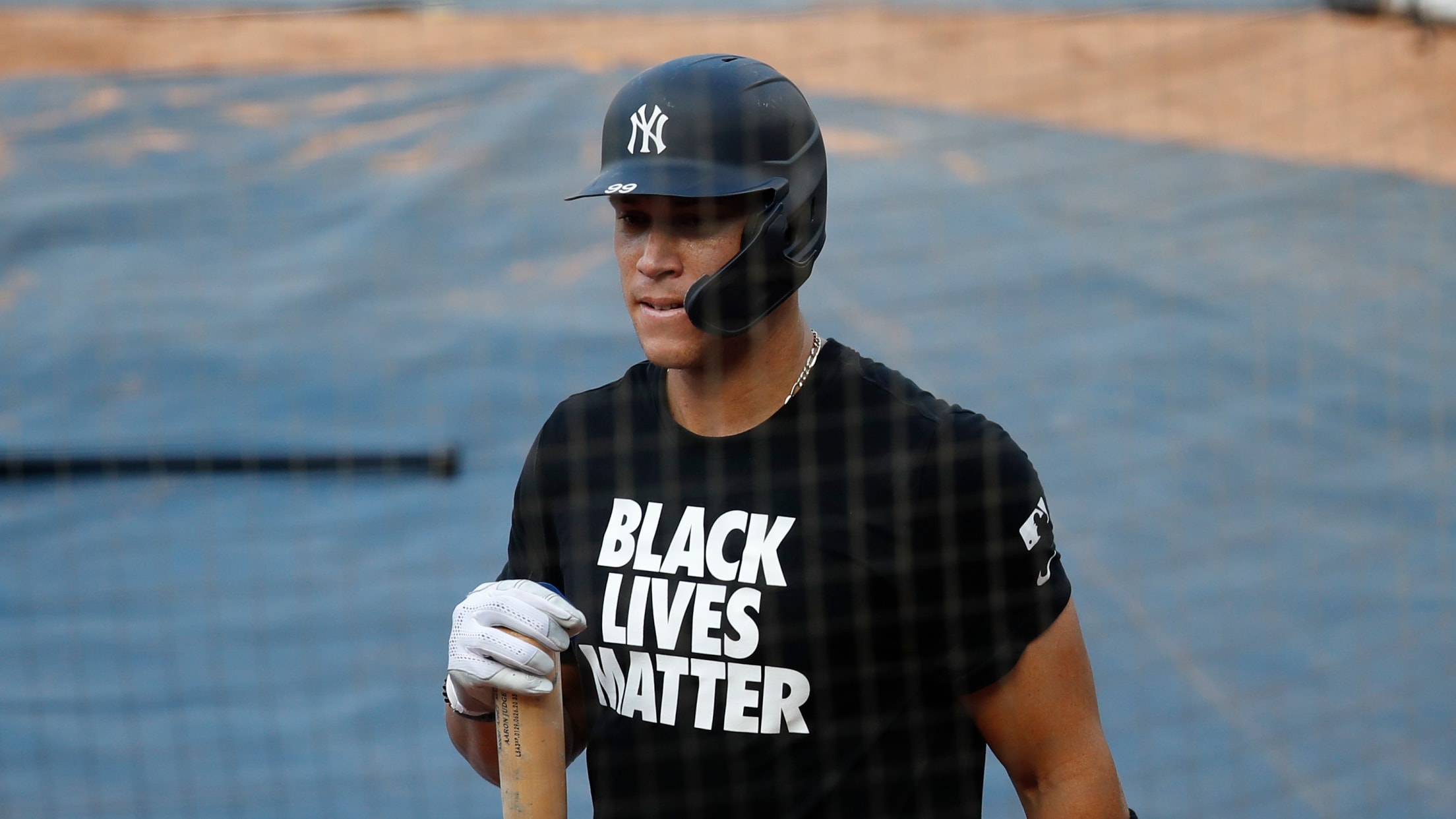
A video released by the Dodgers on July 16 exemplified the multi-racial coalition for social justice that has begun to build around baseball. Kershaw, reigning National League MVP Award winner Cody Bellinger, Enrique Hernández, Walker Buehler and Justin Turner were among 10 Dodgers players who appeared wearing “In This Together” T-shirts and committed to matching funds raised by the sales. All proceeds will benefit the California Funders for Boys & Men of Color Southern California: Our Kids, Our Future Fund (CFBMoC).
Other MLB players have also highlighted the economic disparities that often limit access to opportunities for people of color in America.
In a moving nine-part essay on Instagram, Rockies outfielder Ian Desmond wrote that Floyd’s death under the knee of Derek Chauvin, a white police officer, “broke my coping mechanism.” Desmond -- who has a Black father and white mother and identifies as Black -- went on to cite baseball’s issues with inclusion, particularly among youth players from disadvantaged communities, and health concerns as factors in his decision to sit out the pandemic-shortened 2020 season.
Desmond described a recent visit to the Little League fields he was “basically raised on” as a kid in Sarasota, Fla.
“They’re not in great shape,” Desmond wrote. “They look run down. Neglected. When I saw a Cal Ripken Little League schedule tacked on a bulletin board, I walked over to check it out, and it was from 2015. The only thing shiny and new, to my eye, was a USSSA banner. Travel ball. Showcases. So, not so much baseball for all anymore … as much as baseball for all who can afford it.”
As Desmond aptly observed, the rise of travel ball and showcase circuits has led to socioeconomic stratification at the sport’s grassroots level. Families feel pressure to meet the associated costs of travel ball to ensure their children are seen by MLB scouts and college coaches, who are typically allotted only 11.7 scholarships for 35 spots in Division I baseball programs.
“It's one of our challenges,” says Tony Reagins, the former Angels GM who is now MLB’s Chief Baseball Development Officer. “We understand that the travel ball or the showcase circuit is real. What we've seen is there is really a shift from community baseball or recreation baseball to a whole travel-ball mindset. What we need to do as an organization, as a country, is realize the value of community baseball and the opportunities that community baseball offers.”
MLB has endeavored to keep baseball accessible for youth players from underserved communities through the development of programs such as the Play Ball initiative, Hank Aaron Invitational (which is co-run by the MLBPA), Breakthrough Series and Reviving Baseball in Inner Cities (RBI). It has opened a network of MLB Youth Academies across the country, beginning in Compton, Calif., in 2006.
In February, MLB hosted the fourth annual Dream Series in Tempe, Ariz., which brings together a diverse group of nearly 60 high school pitchers and catchers for a development camp centered around Martin Luther King Jr. weekend.
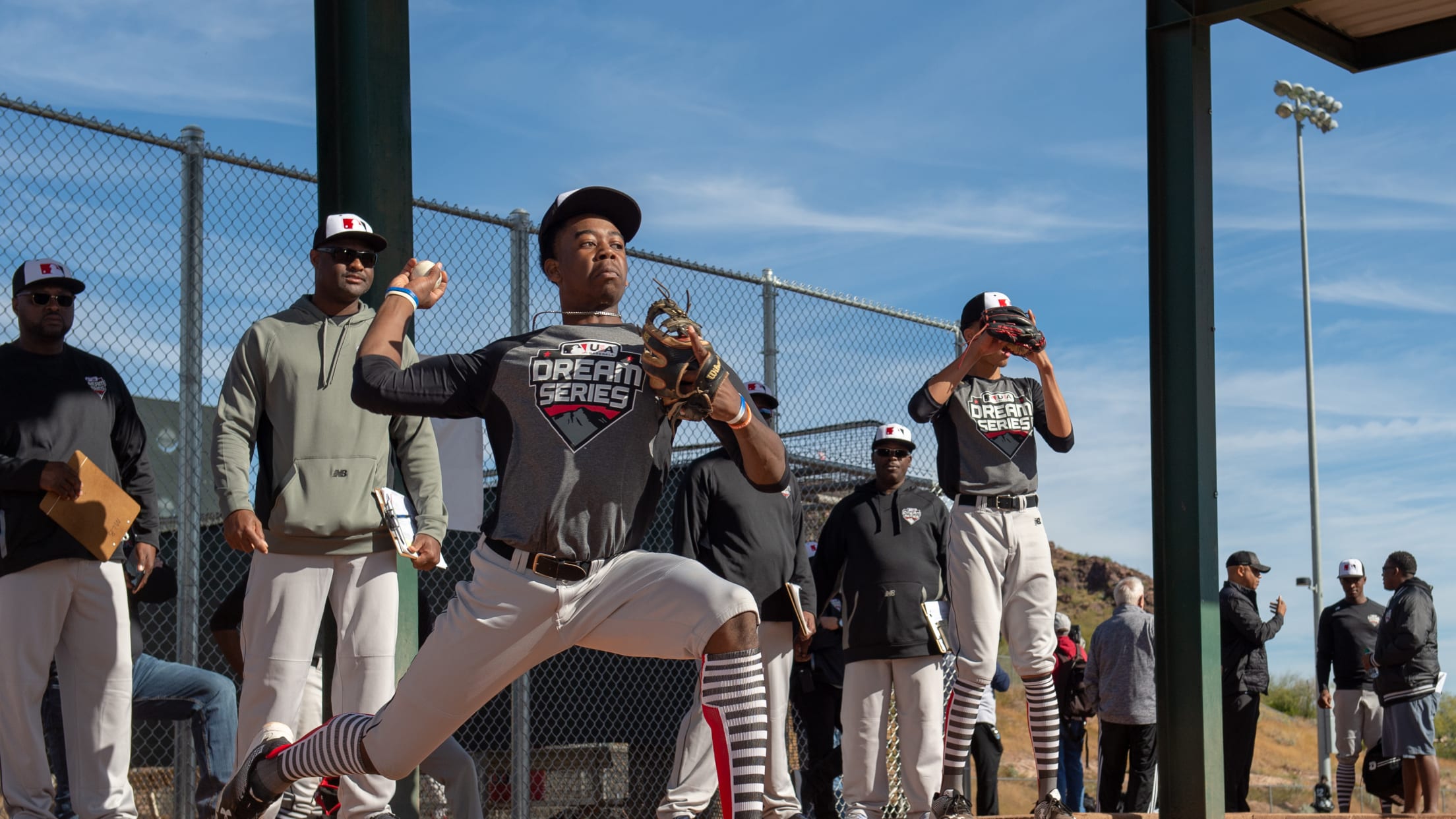
Of the approximately 150 players who participated in the first three Dream Series events, 25 were selected in the 2017-19 MLB Drafts, including top prospects Hunter Greene (Reds), Simeon Woods Richardson (Blue Jays) and Mike Harris (Braves). Many others have gone on to play collegiately, including Vanderbilt right-hander Kumar Rocker, who is considered a favorite to be taken No. 1 overall in the 2021 Draft. Over the last five years (2016-20), a total of 136 players from MLB diversity-focused development camps (Breakthrough Series, DREAM Series, Hank Aaron Invitational), MLB Youth Academies and the Reviving Baseball in Inner Cities (RBI) program have been selected in the Draft.
Despite those success stories, Reagins acknowledged that there is still work to be done to encourage and sustain Black participation in baseball. He read Desmond’s essay and said he had a chance to speak with the 34-year-old veteran. Reagins says Desmond made several valid points, though he was also open to learning more about MLB’s ongoing efforts at the youth level.
“We walked away with a desire to work together, which is what we need,” Reagins said. “I believe the biggest challenge in youth baseball is the fragmentation. You have so many organizations and individuals doing their own thing in different areas around the country, all with the intent and the mindset to get more kids playing, developing ballplayers. But there's a lack of connectivity. I believe that's where it's really important for me to do better -- making that bridge and that connection to the number of organizations that are around the country. It’s a tall task, but it’s something that I'm willing to undertake.”
Reagins said he is sensing more overt interest from current MLB players in helping to continue to grow the game in Black communities, which will not only help improve representation on Major League rosters -- which had Black players occupying roughly 20 percent of spots in the 1980s -- but also help foster the next generation of Black executives, coaches, scouts and fans across baseball.
“I believe the interest was always there, I just don't know if it was vocalized,” Reagins said. “I believe now it's vocalized, and there is a strong desire to move forward. I believe this whole pandemic situation, the racial climate, has forced us to be connected in a deeper way and a more significant way. It’s forced us to have conversations that we hadn't had in the past, whether it be the league, the Players Association, or this newly formed Players Alliance, which I believe is going to be helpful moving the game forward for African-American players.”
That responsibility is felt by Betts, the 2018 American League MVP winner and arguably the game’s most prominent Black player.
“Obviously, MLB can help, but I think it’s on us, the Black players, to bring it to the Black communities and kind of make baseball cool,” Betts said during a Zoom call with reporters in Los Angeles. “I think that’s where the disconnect is. Us as Black people don’t think it’s that much fun. So we have to find a way to make it fun for the Black community and get more guys here.”
Obviously, MLB can help, but I think it’s on us, the Black players, to bring it to the Black communities and kind of make baseball cool. I think that’s where the disconnect is. Us as Black people don’t think it’s that much fun. So we have to find a way to make it fun for the Black community and get more guys here.
Mookie Betts
That conversations about race relations are taking place now is a notable shift from where the baseball landscape stood several years ago. In 2014, NBA star LeBron James wore an “I Can’t Breathe” T-shirt before a Cleveland Cavaliers game, referencing the final words of Eric Garner, who died after being put into a chokehold by a police officer in New York. In 2017, anthem protests reached their peak in the NFL, prompting many debates across the country.
But MLB players were more quiet on these issues, even in 2015, when Freddie Gray’s death in police custody set off civil unrest in Baltimore that forced the Orioles and White Sox to play a game at Camden Yards without fans.
In 2017, Bruce Maxwell, at the time a backup catcher for the A’s, became the first MLB player to take a knee during the national anthem. A few players, including DeShields, have expressed regret at not supporting Maxwell, who joined the Mets on a Minor League deal a few weeks ago.
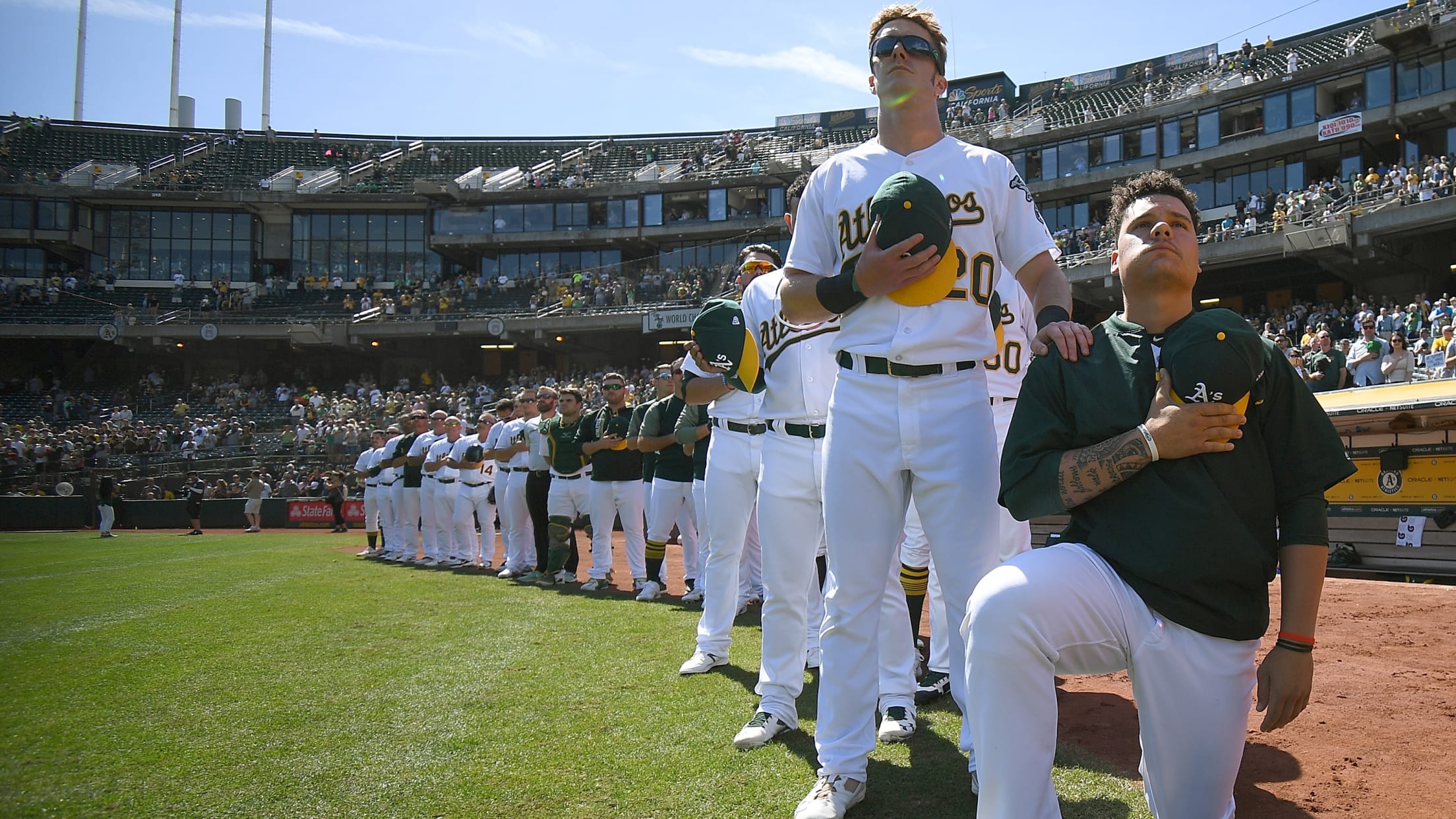
“The reason why nobody else knelt with Bruce was because nobody else wanted to sacrifice themselves,” Stewart said. “It was a heavy sacrifice for Bruce to do that at the time. I was shocked, and I was amazed that no other Black players stood by him when he did that. As I said, it happened because nobody wanted to make the sacrifice."
Without the plurality that their counterparts in the NBA and NFL enjoy, Black players in MLB feared they would be left exposed to possible retribution that could endanger their livelihoods if they demonstrated or spoke out, according to Maybin. Maxwell, who appeared in the #Justice4BLM video, is now listed as a member of The Players Alliance.
“As far as the Black players, I think a lot of us weren't ready for what happened,” Maybin said. “Hindsight is 20/20. Not only do we owe Bruce an apology, we continue to talk about Bruce, and I continue to let him know that I will mention his name because a lot of us feel that we left him hanging. What happened to Bruce might not have happened if all 68 of the guys that represent the Black community in baseball would have taken a knee with him. Guys have expressed their remorse towards him. Whether you agreed with him or not, Bruce deserved for somebody to support him, and most of us were not there to support him in the way that we should have.”
On July 20 at the Coliseum, on the same field where Maxwell first took a knee three years ago, anthem protests returned to MLB. Several Giants players and coaches, including manager Gabe Kapler, kneeled for “The Star-Spangled Banner” prior to an exhibition game against the A’s. Joey Votto and Amir Garrett were among the Reds players who followed suit the next day in Cincinnati. Cardinals ace Jack Flaherty wore an “I Can’t Breathe” T-shirt while the anthem played before an exhibition game in St. Louis.
“Everybody in professional sports that has a platform can take meaningful action by amplifying Black leaders’ voices and our Black teammates’ voices and being allies in their fight against social injustice, racism and police brutality,” Kapler said in June. “White men in sports haven't been vocal enough. White men in baseball haven't been vocal enough. I have not been vocal enough. And I've been in professional baseball for 25 years. That's too long to not leverage my privilege to partner with the Black community on these issues.
“What's really been brought to light as I listened is that my Black teammates were damaged by racially charged conversations that they were witness to. They've had to bite their tongues, paying attention to power dynamics not present for my white teammates. They may have felt that their jobs were at stake when all I ever had to think about was whether I was talented enough to survive in the Major Leagues. So I consider it my responsibility when I hear racist or sexist or homophobic language to have the difficult conversation with my teammate, and to challenge injustice anywhere I see it.”
Demonstrations received a bigger spotlight on Opening Day, with Phillies outfielder Andrew McCutchen and his wife, Maria, penning a message that was narrated by actor Morgan Freeman before the games. Betts joined multiple Giants, including Kapler, Hunter Pence, Pablo Sandoval, Mike Yastrzemski and Jaylin Davis, in taking a knee during the national anthem at Dodger Stadium.
In 2016, Betts said that he would never take part in the protest initiated by Kaepernick out of his respect for his father, who served in the Air Force during the Vietnam War. His stance has since evolved.
“I wasn’t educated,” Betts told reporters after the Dodgers’ opener on July 23. “My fault. I need to be educated on the situation. I know my dad served and I’ll never disrespect the flag. But there’s also got to be change in the world. Kneeling has nothing to do with those who served our country. Kneeling is for the injustice.”
The Twins, who pledged $25 million toward racial justice initiatives, stopped their home opener at Target Field at 8:46 p.m. to hold a moment of silence for Floyd.
In Oakland, Khris Davis and Tony Kemp, who founded “THE +1 EFFECT” campaign to promote productive dialogue about race, each raised a fist while standing for the anthem on Opening Day. The gesture was replicated by six Mariners -- Gordon, Kyle Lewis, J.P. Crawford, Shed Long Jr., Mallex Smith and Justus Sheffield -- in Houston. Maybin was among several Tigers who kneeled for the national anthem in Cincinnati. Aaron Hicks and Giancarlo Stanton later became the first players to do so for the Yankees.
Why kneel now?
“Because I’m a Black man living in America,” Hicks told reporters. “I should be judged by my character and not by my skin tone.”
“I think that you're going to see some type of movement in the game,” Stewart said. “No doubt about it. You're going to see some type of movement. You're going to see people that are starting to be a little bit more active in their thoughts. Because I think what's been recognized, if nothing else, is that by being silent, you accomplish nothing, and you make it acceptable to continue with the practices that we've seen in the game of baseball and across this country.”
Stewart’s words proved prescient after a new wave of protests arose organically this week following the police shooting of Blake, who survived his gunshot wounds but is paralyzed from the waist down.
Much like Robinson, this generation of Black players is refusing to be silent and continuing to push for racial equality and social justice in America. For many, that fight superseded their occupations as professional athletes this week.
“I felt that I needed to be a part of what’s going on,” said Cubs outfielder Jason Heyward, who chose not to play on Wednesday night in solidarity with players sitting out across the league. “I say that because we made these statements together as a Players Alliance, as players in MLB, that it’s time for us to stand up and be part of the cause and not just sweep it under the rug. And if we just went out there and played and ignored what the NBA was doing and ignored what’s happening right now, then I feel like that would be going back on our word.”